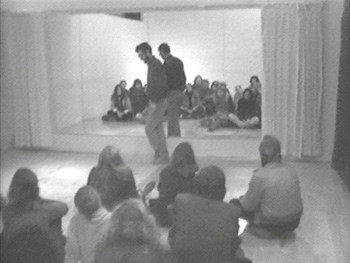PERFORM A LECTURE! SERIES OF 6 EVENTS ON PERFORMANCE LECTURES, SUPPORTED BY CAPITAL CULTURE FUND.

This publication is a continuation of the investigation into the artistic genre of the lecture performance, which we pursued within a series of six parts called Perform a Lecture! in collaboration with different institutions in Berlin throughout the year 2010.
After first appearing in the visual arts in the 1960s as a particular form of performance, the lecture performance received growing attention within the last years: The curatorial collective “Unfriendly Takeover” organized a series of “Performing Lectures” at Atelierfrankfurt in Frankfurt/Main between the years 2004-2006, and the Kölnischer Kunstverein in Cologne organized an exhibition on the subject in 2009. Yet, we don’t feel the genre has lost any of its fascination, so we set out to explore it further and immerse ourselves into finding out about its productivity.
The aim of Perform a Lecture! was to interrogate the timeliness of the format and to engage with the ‘politics’ of the medium. The lecture performance occupies an ‘inbetween zone’, which inevitably in- or explicitly thematizes the site of artistic experience, an alternative access to and dealing with knowledge through art, as well as the exceptional relation between the artist and his/her audience. Therefore, we believe that the lecture performance is a form which allows us to analyze shifts in the setup of the artistic context and its mechanisms – including the conception of the author and creativity, the institution and its spaces, and the fragile net of relations between the different protagonists in the arts.
The series Perform a Lecture! consisted of six new performances by international artists, which were accompanied by a conversation between the artist, the organizers, and a guest from fine arts, theater, and/or theory, jointly reflecting on the experience and the potential of the form.
The texts in this publication follow-up to the performances and the discussions held and intend to crystallize the most productive questions from the series. The journal collects reflections from the conversation partners, each taking up on an issue discussed with the artists and audience, and pursuing this interest in depth. The texts and dialogues are not necessarily responding directly to each performance, but deal with the issues raised by it and the subsequent discussions in its own medium. We understand this publication as a reader which starts a critical exploration of the genre.
In her introduction, Ellen Blumenstein analyzes the Lecture Performance in relation to art as a form of thought as defined by Deleuze/Guattari in their book “What is philosophy?” and constructs a frame that allows to understand Performance Lectures as a specific format in the context of art which adjourns to its liminal spaces where art and other spheres meet. Felix Ensslin, who accompanied all conversations as a co-host to the intellectual investigation into the subject, invited the artist Ulf Aminde (who is a performer himself and has witnessed almost all events) to jointly reflect on single aspects of their respective experiences. Erik de Bruyn is a scholar and art historian who extensively worked on Dan Graham. De Bruyn accompanied the performative walk through Bruno Taut’s horseshoe estate in the outskirts of Berlin, which was conceived and conducted by Graham and the Argentinian artist Nicolas Guagnini, and took it as a starting point to analyze the function of humor in Graham’s artistic practice. The curator Solvej Ovesen accompanied the three successive nights with Pedro Neves Marques and co-moderated the last discussion. Starting from there, she looks at history, life and art simultaneously to explore the notion of A-knowledge. Clemens Krümmel analyzes the position of the artist between “acting in research” and “acting in representation” in performative lectures, taking Ellie Ga’s “Fortune Tellers” as an example. The art critic and curator examines the artist’s role as a storyteller/narrator, and her relation to research and knowledge. In a dialogue moderated by Ellen Blumenstein, the music curator and critic Christoph Gurk and Erik Bünger ponder on the specificities of the music as opposed to sound and the voice, and its effect on and the affect of the listener/audience, as experienced at his new performance “The Third Man”. The project by Olivia Plender and Romeo Gongora “Family to Nation” was laid out as an adapted family drama, infiltrated by Agosto Boal’s theater of the oppressed, and functioned as a first experiment of the format. It is not yet fit for conclusion, so we decided to collect voices from different participants, including the Swedish curator Kim Einarsson, who had moderated the evening. In a collage, we bring together reflections on the potential of this form and projections on its possible future. Last but not least, the final conversation following the last Lecture Performance “Indirect Language” written by Cally Spooner and presented by Will Holder with Helmut Draxler, Dieter Roelstraete and Dorothea von Hantelmann was recorded, transcribed and reworked not as a conclusion to the project, but as a collection of our preliminary set of questions for further thought.
We hope you enjoy and get inspired!
Ellen Blumenstein and Fiona Geuß
We would like to specially thank the Hauptstadtkulturfonds for making Perform a Lecture! possible.
Thank to the participating artists Dan Graham, Nicolas Guagnini, Pedro Neves Marques, Ellie Ga, Erik Bünger, Olivia Plender, Romeo Gongora, Will Holder, Cally Spooner, to our cooperation partners Arsenal – Institute for Film and Video Art (Stefanie Schulte-Strathaus und Uli Ziemons), .HBC (John McKiernan), ICI Kulturlabor Berlin (Luca di Blasi), Radialsystem V (Jochen Sandig), Eternithaus/Tiergarten Eins (David Fuld), Staatliche Akademie der Bildenden Künste Stuttgart (Lehrstuhl für Ästhetik, Kunstvermittlung und psychoanalytische Kulturtheorie, Felix Ensslin) and the participants of the conversations Eric de Bruyn, Solvej Ovesen, Clemens Krümmel, Christoph Gurk, Kim Einarsson, Helmut Draxler, Dorothea von Hantelmann, Dieter Roelstraete.
